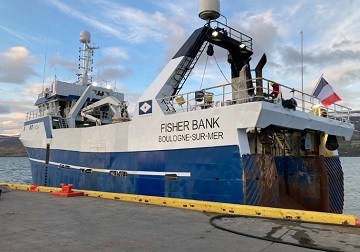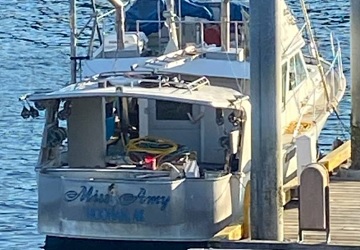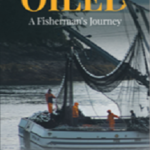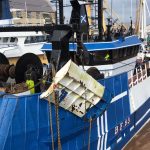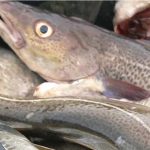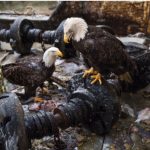Monthly Archives: July 2022

DC North Atlantic Right Whale Ruling
“The MLU is exploring all legal options to ensure that forthcoming judicial decisions on NOAA and NMFS’s arbitrary assumptions will finally result in some meaningful protections for the NARW that do not needlessly jeopardize Maine’s heritage industry without any corresponding benefit to the right whale population” Virginia Olsen. Judge Boasberg was correct in stating “the crux of the problem is that the 2021 BiOp projects that in the coming years the American lobster fishery will continue to potentially kill and seriously injure North Atlantic right whales at over three times the sustainable rate.” That projection is not supported by the best scientific available – far from it in fact. Until NOAA and NMFS stop relying on arbitrary assumptions and apportionments and start paying attention to the best scientific data available, which reveals that Canadian fisheries are the source of almost all known causes of entanglements, then both the North Atlantic right whale and the American lobster fishery will go extinct. 13:02
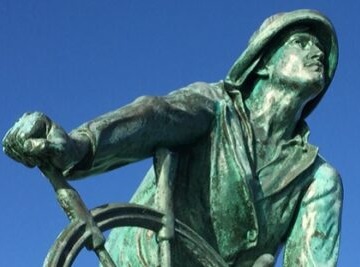
NOAA – A Failed Agency, Part 2
NOAA. What would I ask the commerce department to look for? I would ask to see the total budget plus the line-item expenditures for each division. They have purchased hundreds of thousands of whale and seal brochures warning people and whale-watch boats to stay away. They have been sitting in the building for years and have never been distributed. They have a $150,000-dollar Marine Mammal Trailer and Van outfitted with air conditioning and heat and it never gets used. I haven’t seen it used – ever! They have a 25hp 4-cycle Evinrude outboard which is sitting in that trailer and has never been used. I would ask for an audit by line item for all of the Divisions. Sam Parisi, Gloucester, Mass. >click to read< Read NOAA – A Failed Agency, >click to read< 10:06
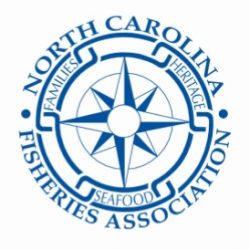
North Carolina Fisheries Association Weekly Update for July 11, 2022
We cannot emphasize enough how important it is for commercial fishermen and others associated with the seafood industry to take an active interest in the November general election. Find out who the candidates are and where they stand on the issues that are important to you. If you need to know who is on the ballot this November for the NC Senate and House in your district, let us know and we’ll get that information to you. Candidates need your support by your vote and financially. >Click here to read the Weekly Update<, to read all the updates >click here<, for older updates listed as NCFA >click here< 09:26
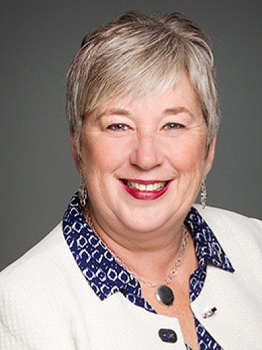
Did Ottawa truly understand the impacts of closing most salmon fisheries on the Pacific coast?
Twenty-one years ago, I married into a fishing family. Soon after, we started Skipper Otto to help connect customers with locally sourced and sustainably harvested seafood. The spring is always the busiest time. There are boats to prepare for the season, fishing nets to repair, staff to hire and operations to launch. At the end of June 2021, when boats had already left the docks and were on the fishing grounds, the federal government announced the closure of 60 per cent of salmon fisheries on the Pacific coast. Specifically, these closures affected commercial salmon fisheries and First Nations communal commercial fisheries. Bernadette Jordan, then minister of fisheries and oceans, announced the closures to reduce pressure on salmon stocks. >click to read< 08:42
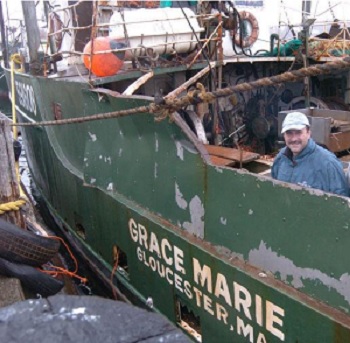
F/V Grace Marie: ‘They knew what to do and they saved their lives’
Seven fishermen are home safe in Gloucester after their fishing vessel sank about 92 miles east of Gloucester. The crew of the trawler F/V Grace Marie were rescued by the good Samaritan gillnetter F/V Dawn T. after their boat began taking on water Friday night. The Grace Marie issued a mayday around 10 p.m. saying the boat was experiencing rapid flooding, according to Coast Guard Petty Officer Ryan Noel. The Coast Guard put out an urgent marine information broadcast, asking any vessels nearby to answer the Grace Marie’s mayday. F/V Dawn T answered the call, according to the Coast Guard, and was able to bring all seven crewmen aboard and ferry them home. There were no injuries reported, Noel said. The crew arrived back in Gloucester around 1 p.m. Saturday, he said. >click to read< 18:00
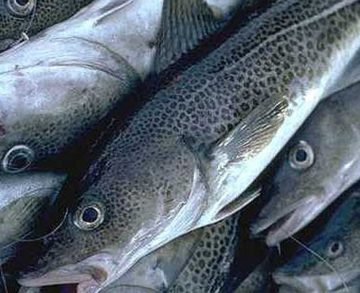
30 years after the moratorium, what have we really learned about cod and science?
“Although the industry has many problems, a shortage of fish is not one of them,” confidently pronounced the 1982 report of the Task Force on Atlantic Fisheries, which is commonly called the Kirby report. But a shortage of fish, as we now know, would become an insurmountable problem a decade later —so much so that on July 2, 1992, the federal government shuttered the commercial Northern cod fishery, once Canada’s largest fishery. So where have these vast learnings taken us 25 to 30 years on? Fisheries management remains highly dependent on modelling. >click to read< 17:28
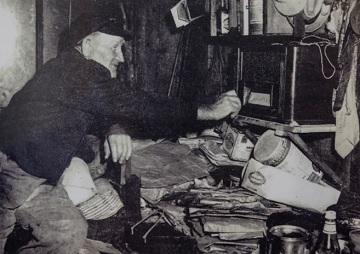
Meet Teddy, the St. Andrews Hermit
He was here before the condos, before the all-you-can-eat crab legs and long before Thomas Drive was ever mentioned in a country song. He could walk the white sands, fish the emerald, green waters and never had to worry about traffic. Even though Panama City Beach was yet to have a name, he was one of the first residents with the beach all to himself. His name was Teddy. And he was a hermit. Teddy Tollefsen wasn’t always a hermit, but he was always a fisherman. He was born in 1882 in Trondheim, Norway. He left home at 14 to sail the seas and first came to America in 1906 after fishing waters around the world. Tired of working for others, Teddy began fishing for himself, first settling in Pensacola before moving on to St. Andrews where he hoped to try his luck fishing for red snapper. In 1929, the Bahamas Hurricane made an unwanted visit to Panama City and changed Teddy’s life forever. photos, >click to read< 15:59
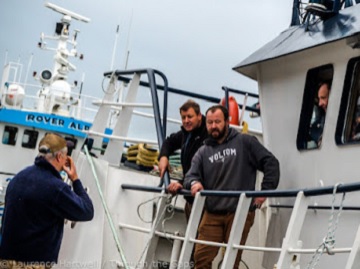
Training for new recruits needs to be extended says Seafish.
Simon Potten, Head of Safety and Training, discusses how local engagement and more training could be the key to making the fishing industry safer. During Maritime Safety Week (4-8 July) which was a great platform for raising national awareness of safety in the commercial fishing industry. We have been supporting Maritime Safety Week since it was started by the Department for Transport in 2018. In those five years there have been 23 deaths on commercial fishing vessels in the UK. Unfortunately, most of them came in 2021 when we tragically lost 10 fishermen. The worst year in over a decade for lives lost. Which is why I think Maritime Safety Week is more important this year than ever before. So, what can we do to make the fishing industry safer? >click to continue< 12:13
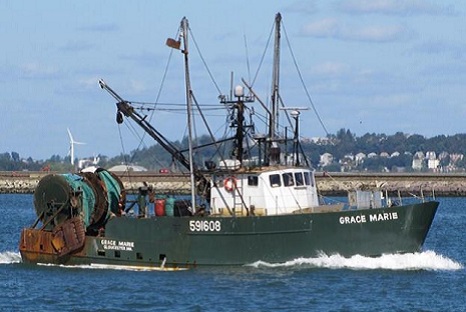
Good Samaritan vessel rescues 7 fishermen from Gloucester’s F/V Grace Marie
Seven fishermen were rescued by a good Samaritan fishing vessel after their vessel began taking on water Friday night. The crew of the Gloucester-based vessel Grace Marie issued a mayday around 10 p.m., saying the boat was taking on water and experiencing rapid flooding, according to Coast Guard Petty Officer Ryan Noel. The 65-foot fishing boat was about 80 nautical miles east of Gloucester. The Dawn T answered the call, according to the Coast Guard, and was able to bring all seven crewmen aboard and ferry them home. >click to read< photos@ Marine Traffic 07:32
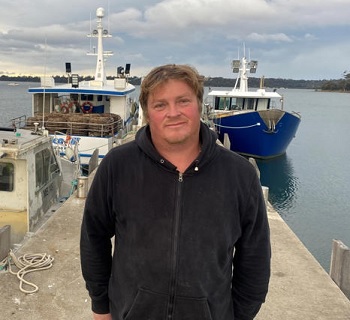
Commercial rock lobster fishers on Tasmania’s east coast are worried about a proposal
Rock lobster fisher Adam Johnson had hoped his children could follow in his footsteps, but a proposed change to how the industry operates has him worried about the future. At the moment, bigger rock lobster boats carrying 60 pots are only able to fish off the west coast. The government is now proposing to expand that, to include the north-west, and north-east. Break O’Day Mayor Mick Tucker is strongly opposed to the change — in the council’s submission to the government he labelled it reactive, ill-advised and inequitable. The former commercial fisherman is worried if the change is made as proposed, the local industry will further contract, ultimately impacting local services and the town’s economy. >click to read< 19:14

32 years later, investigators continue searching for answers in murder of Joseph Fernandes
It has now been 32 years since San Diego resident Joseph Fernandes was brutally murdered aboard a tuna boat docked at the G Street Pier and the case remains cold.“He’s never far from my thoughts,” said Mary Montgomery, Fernandes’ granddaughter. “I do have a sense of peace when I’m near the water.” Fernandes was 69 years old, the retired fisherman was working as a night watchman aboard the Sea Quest Tuna Boat, which was docked at the G Street Pier. As night fell between July 7th and 8th 1990, Fernandes would take his last breath on that boat. >click to read< 16:30
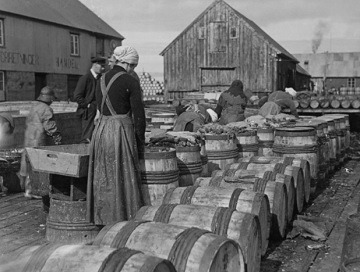
Iceland’s herring girls transformed a town before kicking off a tourist boom
Clad in waterproof coveralls, heavy boots and thick gloves, a group of women line up under the midnight sun, waiting for returning fishing boats to dock. As soon as a ship reaches the harbour, they kick into gear, pulling herring after herring from barrels, decapitating and gutting them, before packing them in salt and spices, singing while they work. Siglufjörður, or Siglo as it is known to locals, is an uncommonly scenic slice of northern Iceland. Before the herring industry started here in 1903, it was a sparsely populated hamlet with little work paid with money rather than meat or other goods. But as salted herring became a staple in many European countries, catching and processing the fish became its main focus and everything changed. >click to read< 11:32
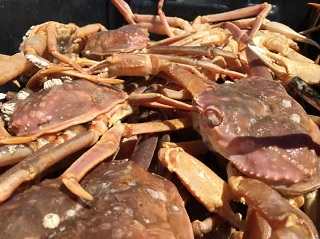
Russian snow crab weighs down our markets
The snow crab fishing season in the southern Gulf of St. Lawrence this year was weighed down by the arrival on the American market of large quantities of this crustacean from Russia. This Russian crab was imported in abundance amid shortages last fall, due to the closure of the fishery in Alaska, and when household spending was on the rise. However, what was selling at a high price then continued to lose its value during the winter, when the American and Canadian governments ended the aid programs linked to the pandemic and when consumers finally deconfined recovered. to travel rather than eat expensive crab at home. Additionally, US buyers continued to buy Russian crab in droves this spring, rather than Canadian crab, before it was affected by the trade embargo due to the war in Ukraine. >click to read< 8:44
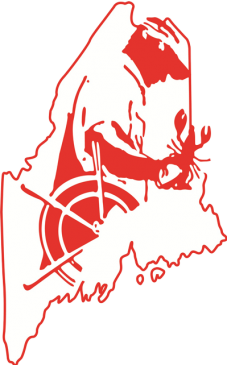
Statement from Maine Lobstermen’s Association on Court Ruling
Below is a statement from the Maine Lobstermen’s Association following today’s decision in a lawsuit filed by the Center for Biological Diversity. The Maine Lobstermen’s Association (MLA) will not allow this industry to go down without a fight. Today’s ruling from the U.S. District Court for District of Columbia is a mixed bag but clearly demonstrates why it’s more important than ever for MLA to have the financial resources to continue this battle. >click to continue< 21:01
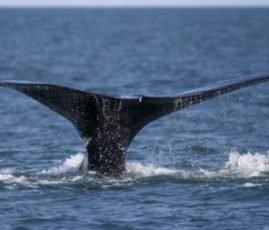
Federal court rules fisheries officials didn’t do enough to protect right whales from lobster gear
A federal court on Friday ruled in favor of environmental groups that had filed a lawsuit against the government and the Maine Lobstermen’s Association claiming federal fisheries officials had failed to protect endangered North Atlantic right whales from potentially fatal entanglements in lobster fishing gear, records show. A judge ruled that NOAA Fisheries had violated the Marine Mammal Protection Act and Endangered Species Act when it issued a May 2021 biological opinion and a September 2021 final rule because officials had not done enough to reduce the lobster fishery’s threat to right whales, the plaintiffs in the suit said in a statement. >click to read< 18:00
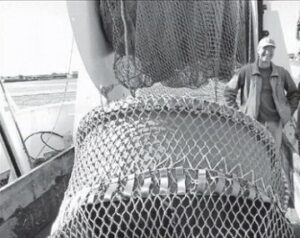
After many years, New England cod seems to be rebounding from overfishing
Atlantic cod, a fish that was foundational to New England’s economy, is being caught at historically low levels. But a research scientist says cod is in the early stages of a comeback. Before Raymond Lees goes fishing, he stops by Reidar’s Trawl Gear in New Bedford, Mass., where he buys custom nets that help him avoid certain types of fish. For commercial fishermen like Lees, cod is known as a choke species, meaning fishermen catch so much of it by accident, they sometimes hit their quota and have to stop fishing for what they really want. But new research from Kevin Stokesbury, a professor of fishery science at the University of Massachusetts Dartmouth, is challenging that claim. Audio report, >click to listen/read< 15:30
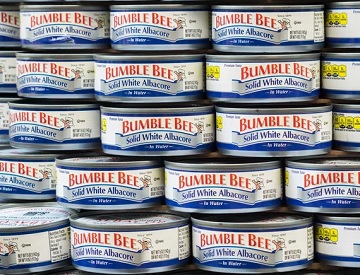
The Untold Truth Of Bumble Bee Tuna
If you’re curious about the history of this thoroughly American product, grab your life vests and Dramamine pills, and set sail with us to discover the untold truth of Bumble Bee Tuna. Have you ever considered the origins of a seemingly always-available product, like Bumble Bee Tuna? Well, if you’ve ever wondered about this tuna industry giant’s history, you may be surprised to learn that when a group of commercial fishing companies joined forces to form the original company, it wasn’t under the name Bumble Bee Tuna, it was known as the Columbia River Packers Association. Founded in Astoria, Oregon in 1899, where its headquarters remained for the next 81 years, the CRPA was a collective formed by A.B. Hammond, who hoped this conglomeration of seven commercial fishing companies would boost the group’s business prowess. >click to read< 13:19
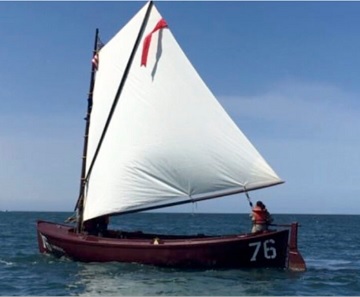
Historic Sailboat begins voyage to Naknek
For more than 60 years, sailboats dominated Bristol Bay’s commercial fishery. Motorized vessels were illegal. Then, in 1951, the federal government finally allowed motorized fishing vessels in Bristol Bay. LaRece Egli, the director of the Bristol Bay Historical Society Museum in Naknek said almost immediately, sailing was made obsolete for the fishery. “I think it’s literally down to 50 or 46 boats or something like that in 1954 and then they just disappear,” she said. By 1952, powerboats outnumbered sailboats 4 to 1. In less than five years, every commercial vessel had a motor. This year, local historians are bringing the sailing tradition back to the bay with a vessel named the Libby, McNeil, Libby, No. 76. >click to read< 10:39
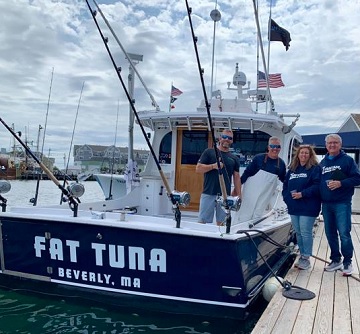
Fans still flock as end of 11th ‘Wicked Tuna’ season nears
“Wicked Tuna,” based in Gloucester, continues to capture the hearts and imaginations of viewers, who continue to flock to America’s oldest seaport to catch a glimpse of one of the show’s boats or its captain and crew. Cathy and Jeff Dyer of Knoxville, Tennessee, are among the recent visitors in search of all things “Wicked Tuna.” “That was one of our missions on our recent trip to New England. Our first impression as we drove through the city was it was much bigger than we expected,” said Cathy Dyer. “When we saw the Fishermen’s Memorial driving into town, we knew we were in the presence of the ‘Wicked Tuna.’ Our visit was very memorable and eventful.” >click to read< 10:06
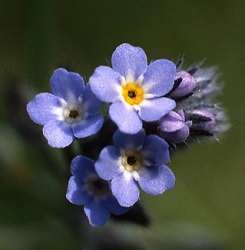
Retired Commercial Fisherman Joseph C. Whaley Jr. of Narragansett, R.I. has passed away
Joseph C. Whaley, Jr., 86, of Narragansett, passed away at home Friday, July 1, 2022. He was the beloved husband of Marjorie “Midge” Whaley for 65 years. Born in South Kingstown, he was the son of the late Joseph C. Whaley, Sr. and Lily (Sohm) Whaley. He was predeceased by his brothers Howard and Babe and his sisters Virginia and Marise. He is survived by several nieces and nephews. Joe was a lifelong commercial fisherman out of Point Judith. He started with the F/V Virginia Marise, which he bought from his father and ran until he was called into the US Army. When he returned from the Army, he bought F/V E. Carl Rice Jr., which he ran for 35 years, often with his wife Midge as his crew. He later ran the trap boat Amelia Bucolo and, once again, F/V Virginia Marise when it returned to Point Judith 50 years later. >click to read< 08:37
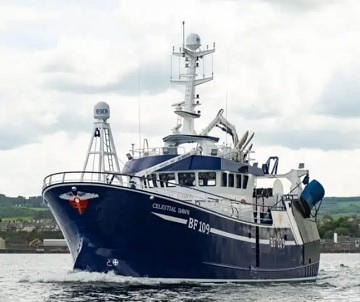
New Concept Design Provides Comfort And Economy
There’s nothing like a returning customer – and this isn’t the first time that George Hepburn and his partners have been to Macduff for a new trawler, as the previous Celestial Dawn BF-109 came from the same yard back in 2000. The new Celestial Dawn, which will be fishing from Peterhead primarily for prawns on North Sea grounds, is the first of three sister vessels being built to the same entirely new design developed by Macduff Ship Design and Macduff Shipyards. The second in the series is under construction already at the yard’s fabrication hall in Buckie, and work on the third is scheduled to begin later this year. photos, >click to read< 07:55
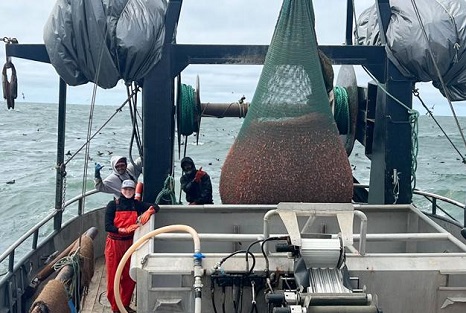
Floating offshore wind generator proposals worry fishing industry
From her home overlooking Yaquina Bay on the Oregon coast, Kelley Retherford can watch as commercial fishing boats arrive at the nearby Port of Newport, delivering their catch to one of several seafood processors that line the waterfront. Saltwater is in her family’s blood, she said. Along with her husband, Mike, and their four adult children, they own and operate four fishing trawlers, harvesting everything from Pacific whitefish and hake to pink shrimp and Dungeness crab. That way of life, however, may be disrupted by a growing interest in offshore wind generators to help achieve ambitious government-mandated zero-carbon energy goals. photos, >click to read< 18:50
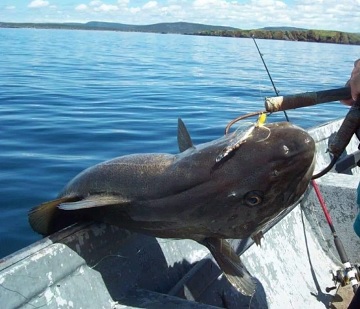
Whitbourne cod fisher hoping for another big one after monster catch on last trip
Hilda Whalen says she finally feels good enough to get back on the water after a battle with cancer and hopes she can replicate her last catch. Whalen caught a 30-kilogram, (66lb.) six-foot cod in Trinity Bay during her last fishing trip in 2018. “At the time I didn’t think it was a big thing. A friend of mine was holding up a cod fish, and I just whacked off the picture to him saying ‘Try to hold this one up with one hand!” “Someone else said, ‘did you ever think of throwing it back?’ … I said no. What Newfie would throw that back in the water after the cod moratorium?” >click to read< 17:45
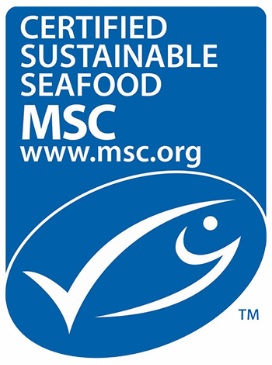
Enviros challenge Maine lobster fishery’s sustainability certification
The Natural Resources Defense Council and other conservation groups are challenging a seafood watchdog’s recertification of the Gulf of Maine lobster fishery as a sustainable resource. The Gulf of Maine’s lobster fishery first received the Maine Stewardship Council’s sustainability certification in 2013, and since then participating lobster businesses have been able to display the council’s blue fish checkmark recognized by eco-minded consumers. Virginia Olsen of the Maine Lobstering Union calls the resource defense council’s effort unfortunate. “Maine fishermen have stepped up to implement whale rules time and time again,”>click to read< 15:21
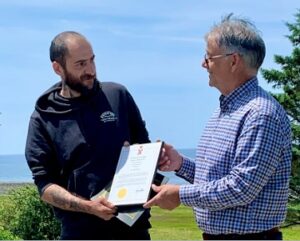
Meteghan NS fisherman reflects on time in Ukraine helping others
When he was on a humanitarian mission in Ukraine to help the people of his home country, Lex Brukovskiy, like countless others, had an app on his phone that alerted him to the air raids. It would go off constantly. It still does. Now back home in southwestern Nova Scotia, the alert went off at 3 a.m. one recent day. Being thousands of miles away doesn’t make the sound any less terrible. It may even make it worse. The Meteghan fisherman says leaving Ukraine was difficult, but he didn’t have a proper visa to stay. After 90 days, he had to come home. >click to read< 10:17
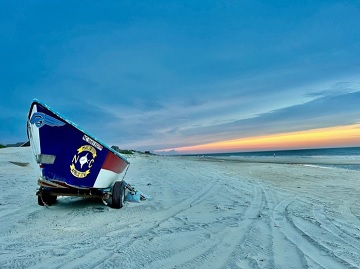
Jake Griffin of Wanchese, NC: I Feel Good About the Future
“Hard to think that I’m one of the young ones in the industry,” commercial fisherman Jake Griffin laughed. “I’m thirty!” Griffin is one the young ones given that the average age of North Carolina watermen is 52 according to a 2017 study of ocean-going fishermen. Born and raised in his homeport of Wanchese, Griffin fishes all over the map, up and down the coast of North Carolina and even out of Alaska and Maine. “I’m shark fishing now,” he said. “I’ve been fishing out of Morehead City. I trailer the boat here and there, chasing what needs to be chased – sharp noses, spinners, hammers.” Griffin began commercial fishing when he was eleven. >click to read< 09:04
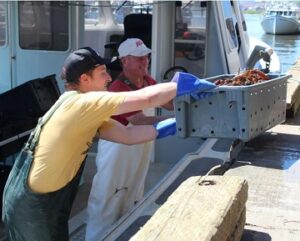
Spring lobster season marked by challenges
An increase in carapace size for canners has meant catches were lower for lobster fishers this season. “In a lot of harbours that had an effect,” said Charlie McGeoghegan, board chair of the Lobster Fishers of PEI Marketing Board. “It will have a positive effect next year, it’s just the short term pain for long term gain kind of thing. Those (lobster) will be around next year, and they’ll be a lot bigger.” Bait was an issue fishers weren’t expecting to deal with this year leading up to the start of the season. Mackerel and herring are what lobster fishers primarily use for bait, many of whom catch the fish themselves, but on March 30, the Department of Fisheries and Oceans Canada announced the closure of those two commercial bait fisheries in Atlantic Canada, as there were concerns dwindling stocks have entered a critical zone. >click to read< 08:17
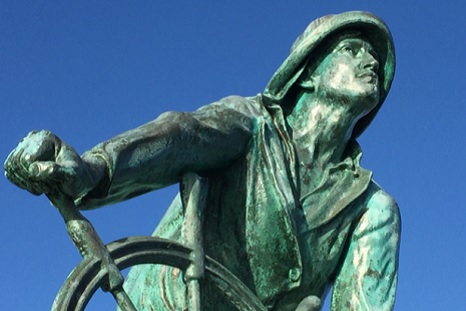
NOAA – A Failed Agency
The Magnuson Act became the law of the land in 1977. Seven years later, the 200-mile limit between Canada and the United States was decided at the world court in the Hague, Netherlands. Both had good intentions, however both failed. Magnuson was supposed to keep fish stocks at a sustainable level and keep maritime communities, like Gloucester prosperous. It made sense. Plenty of fish meant plenty of fishing, processing and a strong waterfront economy. After NOAA Magnuson was signed into law and kicked out the foreign vessels, they contradicted their own intentions of “overfishing” and built up the American fleet by offering government-backed low interest loans. This set off a frenzy of boat building at a time when fish stocks were plentiful. The fleet doubled in size in less than a decade. This offset the gains made from keeping foreign vessels out. Well, it backfired. While we like to think that the foreign fleets raped our fish stocks, it was really NOAA’s’ misguided encouragement and failed policies. “Go get’em boys, it’s all ours now” was their signal to fishermen. >click to continue<, By Sam Parisi. Gloucester, Mass. 18:32






